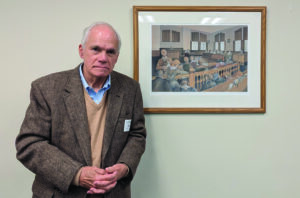
By Megan Koerber
After more than a decade of dedicated service, Jack Crisp is stepping down as chair of the New Hampshire Bar Association’s Continuing Legal Education (CLE) Committee. A past president of the NHBA (1994–1995), Crisp’s time on the committee is marked by steady leadership, thoughtfulness, and a deep understanding of the need for collaboration and continual education in New Hampshire’s legal community.
A Unique Path to Law
Crisp’s journey toward law began not in a classroom, but with his involvement in multiple social movements during his undergraduate years. He graduated from Boston University in 1972 with majors in philosophy and political science. His college tenure was shaped by activism – he was very involved in the anti-war and civil rights movements and served as president of the student union. He also helped raise funds for the launch of a daily campus newspaper and collaborated with its first editor.
Once Crisp decided on law as his career path, he knew he wanted his law school experience to stand out.
“I was in the third class to graduate from Franklin Pierce Law Center,” Crisp recalls. “The uniqueness of FPLC appealed to me, as did the opportunity to be part of something that was and would become special.”
Crisp’s legal career spans 47 years, beginning with a small firm in Exeter. In less than a year, he transitioned to the Rockingham County Attorney’s Office and then to Berlin, where he joined another small firm before launching his own practice. As a solo attorney in Berlin, Crisp faced the challenges of limited mentorship – an experience that would lead him to champion the NHBA’s CLE program.
“I did not have a mentor,” he says. “I learned to be a better attorney by attending Bar Association CLE programs at the Highway Hotel in Concord. That hotel is long gone, [but] since that time, I have strongly supported and believed in the importance of the Bar Association’s CLE program.”
A Decade of CLE Leadership
Crisp’s tenure as CLE Chair has been marked by adaptability and a desire to make the CLE program as meaningful as possible. He led the committee through significant changes in legal education due to the COVID-19 pandemic, adjusting to new ways attorneys connect and learn.
“As the types of learning have evolved with technology and cultural trends, we tried to adapt how, when, and in what format programs are presented. [We started] offering programs at different times during the day, and for different lengths of time,” he says. “We also recognized that many Bar members are opting to watch programs at times convenient to their schedules as opposed to the date the programs are presented. I think it is unfortunate that members don’t come in person as much, though. We lose some of the collegiality that has existed in the past.”
NHBA Director of Professional Development Vince O’Brien notes that Crisp’s leadership was vital during challenging times.
“Jack’s steady leadership sustained the CLE Committee’s mission and helped ensure that meaningful, practical learning opportunities remained available to New Hampshire lawyers,” he says. “He led with thoughtfulness, collaboration, and an inclusive approach that engaged attorneys from every corner of the Bar.”
When asked how he measures success in volunteer leadership roles, Crisp says, “[Success] means providing New Hampshire attorneys with the kind of learning that they need to be good or great lawyers serving their clients and protecting their clients’ interests. We have also tried to engage our members with more thought-provoking program topics and presenters. I hope Bar members have benefited from the programs and enjoyed being together in person when the programs are presented.”
Recognition and Impact
Crisp’s contributions have earned him several honors, including an award from the New Hampshire Paralegal Association, the NHBA’s Vickie Bunnell Award for Community Service, and 603 Legal Aid’s Bruce Friedman Pro Bono Service Award. Notably, the American Bar Association recognized the NHBA for a solo and small firm program Crisp developed during his tenure as NHBA president.
“Jack’s leadership of the CLE Committee has strengthened our Bar in ways that will be felt for years to come,” says NHBA Executive Director Sarah Blodgett. “From navigating the rapid shift to remote programming during the pandemic to continually asking how we can better serve solo and small-firm lawyers across every corner of the state, he has kept the focus on meaningful, practical education. We are deeply grateful for Jack’s service to the NHBA and for his unwavering commitment to helping New Hampshire attorneys better serve their clients and communities.”
Reflecting on his time as chair, Crisp says what he enjoyed most about the role was the sense of community.
“[I enjoyed] the opportunity to teach, work with the Bar staff, and spend time with colleagues,” Crisp says. “Working with the Bar staff has been a wonderful experience. They are a dedicated, professional group of people who work every day to make life better for New Hampshire attorneys.”
Crisp’s steady leadership has left a lasting mark on the CLE Committee and the wider Bar community.
“We extend our sincere thanks to Jack for his dedicated service and impactful leadership,” says O’Brien. “We wish him the very best and look forward to his continued involvement in the life of our Bar.”
A New Chapter
As the CLE Committee turns the page, the NHBA welcomes Cathy Shanelaris as its new chair.
“Cathy is a dynamic and thoughtful leader who brings energy, experience, and a strong commitment to professional development,” says O’Brien. “She’s an excellent attorney, deeply engaged with her colleagues and the Bar, and a natural fit for this role. We are excited for her guidance and the continued growth of NHBA CLE under her leadership.”
